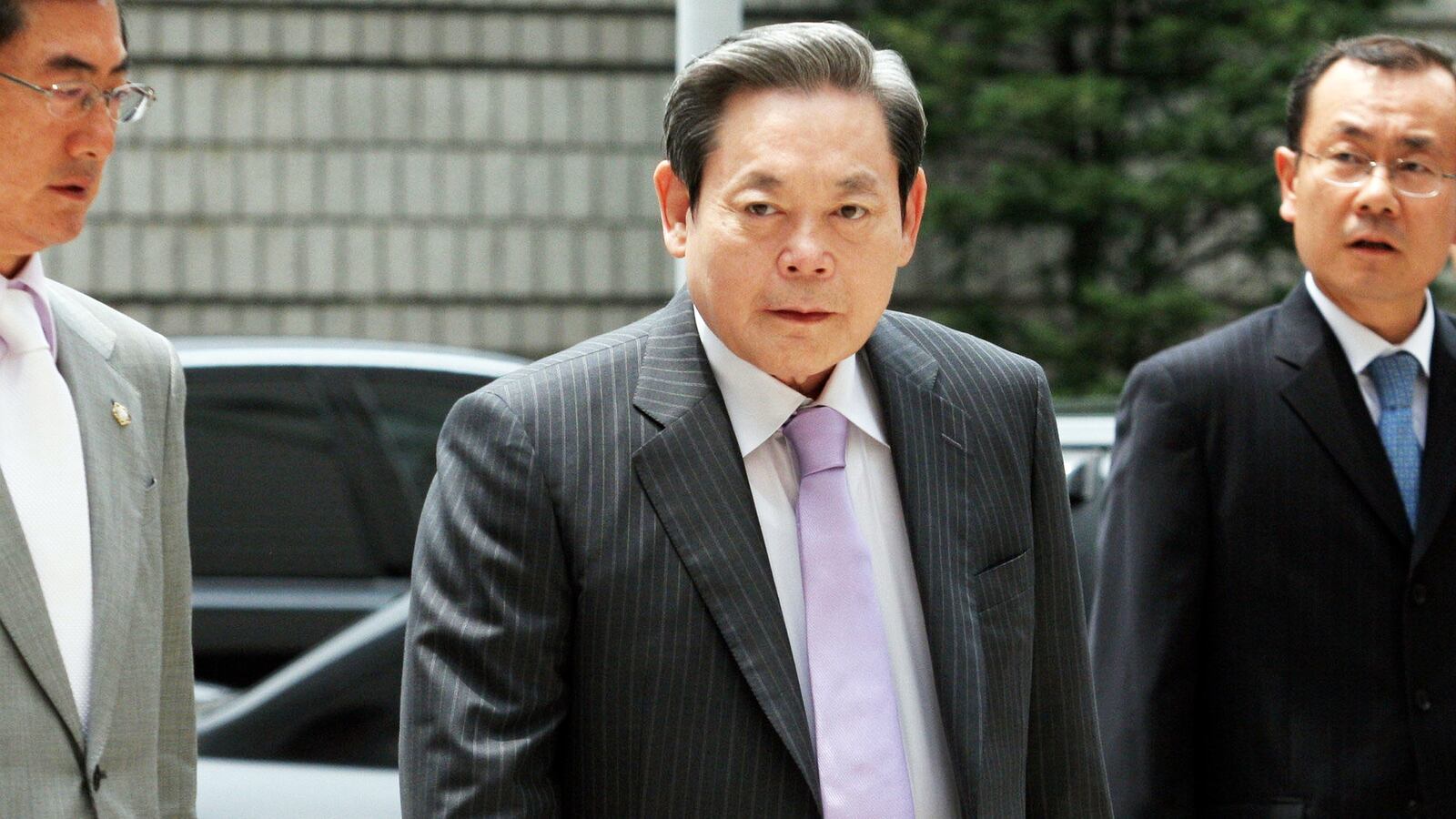SEOUL—Now the battle rages for “the Republic of Samsung.”
The death Sunday of Samsung boss Lee Kun-hee, probably Korea’s most admired, if hated, man, leaves his son, Lee Jae-yong, battling the authorities and a legion of lawyers for control of the empire that controls 20 percent of the Korean economy. The world’s biggest smartphone manufacturer has a turnover that exceeds many republics.
Lee Jae-yong, or Jay Lee, was in Vietnam where Samsung Electronics produces the majority of its smartphones, when he got word that his father was on the verge of death.
Jay Lee, who is 52, made it to his father’s bedside in a Samsung hospital here in Seoul before he breathed his last. His father, 78, had been bed-ridden and mostly in a coma since suffering a heart attack six years ago.
While in Vietnam, Jay Lee had managed to avoid the opening of the latest trial by prosecutors who are out to get him on charges of manipulating share prices in two Samsung companies in a bid to guarantee his inheritance.
Having already spent a year in jail while on trial on charges of bribing the ousted Korean president Park Geun-hye, Lee now faces more jail time if prosecutors can pin another conviction on him—this time for lowering the share price of one company to merge it with another. By pulling off that merger—Hey Presto!—Lee hoped to have enough shares in the combined companies to hold a controlling stake in Samsung Electronics, the crown jewel of an empire whose 80 or so enterprises range from ship-building to insurance to construction to an amusement park rivaling any Disneyland.
Jay Lee is an engaging figure unlike his stern father, who took over the group from his own father, the Samsung founder Lee Byung-chull, more than 30 years ago. And, just to show he means well, he formally apologized for his rule-bending efforts to secure what he sees as his dynastic right.
“I and Samsung have been reprimanded for the succession issue,” he said, looking suitably penitent when promising to “try to not have additional controversy regarding the management succession.”
Those nice words are scorned by reform-minded authorities, however, and it’s the matter of succession that’s sure to consume his energies once he’s gone through an elaborate funeral. His father was the country’s richest man, whose net worth of nearly $21 billion made him the world’s 67th richest person, according to Forbes.

Jay Lee, the only son of the late Samsung Chairman Lee Kun-Hee
Kevork Djansezian/GettyJay Lee, already Korea’s second richest man with a net worth of $6.4 billion, has perfected the art of displays of humility in the face of powers-that-be. But Korean president Moon Jae-In wants to reform the country’s traditional dynastic conglomerate system, known as chaebol, which keeps huge businesses in the hands of a few rich families and effectively controls the entire economy. The current system has led to wild disparities between rich and poor—brilliantly captured by the Oscar-winning movie Parasite.
Geoffrey Cain, author of the newly published Samsung Rising, the Inside Story of the South Korean Giant That Set Out to Beat Apple and Conquer Tech, sees the HBO series Succession as an even more suitable artistic representation. Scene after scene captures the battle to secure a family enterprise making it “an apt show for understanding the Lees,” said Cain.
It’s not as though Jay Lee’s two sisters, who stand to inherit lesser shares of the empire, are fighting him for a bigger slice of the inheritance, but the machinations to seize and hang on against enemies do bear distinct similarities.
“The biggest question is how Jay Lee will cement shareholding control when he might not have enough shares to control the company,” Cain told The Daily Beast. One huge problem: “He might have to sell shares to pay his colossal inheritance tax estimated at $6 billion divided between him and his sisters.”
He also faces a maternal problem. His mother, Hong Ra-hee, “gets a sizable share of the chairman’s assets that could hamper Jay Lee’s quest to control the company,” said Cain. “Jay Lee’s succession is not guaranteed.”

Hong Ra-Hee, widow of Samsung Group chairman Lee Kun-Hee
Jung Yeon-Je/AFP via GettyOne reason prosecutors are reportedly so eager to punish Jay Lee—as seen in his current trial—is resentment over the breaks that Lee Kun-hee got from conservative presidents over the years before the Candlelight Revolution of 2016 ousted Park Geun-hye.
Jay Lee’s father was forgiven in 1997, when the conservative Kim Young-sam exonerated him after he and others had been convicted of bribery charges, and again 10 years later when he was convicted of evading massive taxes, among other things. Forced to resign as chairman of Samsung Electronics, he got totally off the hook when Lee Myung-bak, the conservative businessman who was then president, gave him a complete pardon in 2009.
Jay Lee, however, does have plenty of sympathizers. One advocate, Tara Oh, a retired U.S. Air Force intelligence officer, who founded and now serves as president of the East Asia Research Center in Washington, accuses the government of “aggressive and unreasonable investigations against the company” and denounces the charges against him as “frivolous, without merit and unjust.”
In a lengthy study of the whole case against Samsung, Oh claims that Jay Lee was “convicted of a crime without evidence” simply as justification for the impeachment of Park Geun-hye, who was convicted of corruption and influence-peddling and sentenced to 25 years in prison. It was Samsung’s gift of two horses for the equestrian daughter of a confidante of Park that triggered a series of events that precipitated Park’s downfall. “My Kingdom for a Horse,” was the headline over a Wall Street Journal story at the time.
“The Moon administration appears to be interested in taking over control of Samsung,” Oh wrote. “Globally, the actions of the Moon administration threaten the future of 5G technology developments as well as the global supply chain for critical life-saving biopharmaceuticals and COVID-19 treatments.”
Jay Lee himself avoids what might appear as incendiary statements. In meetings with executives as well as occasional sessions with lower-level staffers, he appears almost soft-spoken and modest, quite the opposite of his late father.
Lee Kun-hee, who set Samsung Electronics on its trajectory as the world’s leading smartphone manufacturer and also the producer of almost half the world’s memory chips, is remembered for berating those around and below him, haranguing them in 10-hour meetings and once simply destroying Samsung products that he said were inferior to those of rivals.
Appropriately, he is most quoted for shouting “Change everything but your wives and children!” at executives during a meeting in Frankfurt in 1993.
After presiding over Samsung’s rise from an also-ran competitor to global dominance, Lee Kun-hee’s final years were marked by debilitating illness. Long before suffering his heart attack in 2014, he had been treated for cancer and lung disease and got about in a wheelchair.
The bombastic formal statement issued by Samsung after his death did not overstate his success: “Chairman Lee was a true visionary who transformed Samsung into the world-leading innovator and industrial powerhouse from a local business.”
That much was true, but the final line of the statement is still up for grabs. “His legacy will be everlasting,” it read. If prosecutors get their way at the latest trial of his son, the Lee legacy may not last forever after all.

